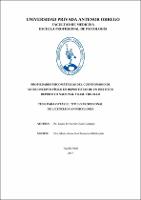| dc.contributor.advisor | Chamorro Maldonado, María Asunción | |
| dc.contributor.author | Sevillano Vásquez, Laura Teresa | |
| dc.creator | Sevillano Vásquez, Laura Teresa | |
| dc.date.accessioned | 2019-12-05T22:28:55Z | |
| dc.date.available | 2019-12-05T22:28:55Z | |
| dc.date.issued | 2017 | |
| dc.identifier.uri | https://hdl.handle.net/20.500.12759/5738 | |
| dc.description.abstract | El presente estudio de tipo tecnológico y diseño psicométrico tiene como objetivo establecer las propiedades psicométricas del Cuestionario de Autoconcepto Físico (CAF) en deportistas de un instituto deportivo nacional filial Trujillo. Este estudio se realizó con una muestra de 350 deportistas conformada por 234 varones y 116 mujeres a quienes se les aplicó el cuestionario de manera individual. Los resultados obtenidos muestran que al estimar la validez de constructo del instrumento, mediante el método Ítem – test, los treinta y seis ítems que lo constituyen, registran índices de homogeneidad superiores al valor minino sugerido (.20), los mismos que registran valores entre .291 y .702.
Mediante el Análisis Factorial Exploratorio, se logró extraer mediante el método de extracción paralelo y rotación oblicua a seis factores, los cuales de forma conjunta explican el 57.23% de la varianza total del instrumento, presentando un índice KMO = .846 y un p-valor altamente significativo en la prueba de esfericidad de Bartlett (p<.01). Asimismo, los resultados del análisis factorial confirmatorio, obtenidos mediante el método de máxima verosimilitud y bajo el supuesto de seis factores relacionados, evidenciaron un p-valor estadísticamente significativo (p =.000) e índices de ajuste satisfactorios (GFI = .952; CFI = .964), con un error cuadrático medio de aproximación aceptable (RMSEA = .084), evidenciando un ajuste aceptable entre el modelo estimado y el modelo teórico.
La confiabilidad del instrumento se estimó, mediante el método de consistencia interna, alcanzando los siguientes índices: Habilidad Física (0.830); Condición Física (0.823); Atractivo Físico (0.789); Fuerza (0.77); Autoconcepto Físico General (0.816); y Autoconcepto General (0.842). Por último, se realizaron las normas percentilares del CAF, según género. | es_PE |
| dc.description.abstract | The present study of technological type and psychometric design aims to establish the psychometric properties of the Questionnaire of Physical Self-Concept (CAF) in athletes of a national sports institute branch Trujillo. This study was carried out with a sample of 350 athletes made up of 234 males and 116 females to whom the questionnaire was applied individually. The results obtained show that when the construct validity of the instrument is estimated by the Item - test method, the thirty - six items that constitute it, show homogeneity indexes higher than the suggested minimum value (.20), which record values between .291 and .702.
Through the Exploratory Factor Analysis, six factors were extracted using the parallel extraction method and oblique rotation, which together explain 57.23% of the total variance of the instrument, presenting a KMO = .846 and a p-value highly significant in Bartlett's sphericity test (p = .000). Likewise, the results of the confirmatory factor analysis, obtained using the maximum likelihood method and under the assumption of six related factors, showed a statistically significant p-value (p = .000) and satisfactory adjustment indexes (GFI = .952; NFI = .964), with an acceptable mean square error of approximation (RMSEA = .084), showing an acceptable fit between the estimated model and the theoretical model.
The reliability of the instrument was estimated, using the internal consistency method, reaching the following indices: Physical Ability (0.830); Physical Condition (0.823); Attractive Physicist (0.789); Strength (0.77); General Physical Autoconcept (0.816); and General Autoconcept (0.842). Finally, the percentile norms of the CAF were made, according to gender. | en_US |
| dc.description.uri | Tesis | es_PE |
| dc.format | application/pdf | es_PE |
| dc.language.iso | spa | es_PE |
| dc.publisher | Universidad Privada Antenor Orrego | es_PE |
| dc.relation.ispartofseries | T_PSI_138 | |
| dc.rights | info:eu-repo/semantics/openAccess | es_PE |
| dc.rights.uri | https://creativecommons.org/licenses/by/4.0/ | es_PE |
| dc.source | Universidad Privada Antenor Orrego | es_PE |
| dc.source | Repositorio Institucional - UPAO | es_PE |
| dc.subject | Autoconcepto físico | es_PE |
| dc.subject | Propiedades psicométricas | es_PE |
| dc.title | Propiedades psicométricas del cuestionario de autoconcepto físico en deportistas de un instituto deportivo nacional filial Trujillo | es_PE |
| dc.type | info:eu-repo/semantics/bachelorThesis | es_PE |
| thesis.degree.level | Título Profesional | es_PE |
| thesis.degree.grantor | Universidad Privada Antenor Orrego. Facultad de Medicina Humana | es_PE |
| thesis.degree.name | Licenciado en Psicología | es_PE |
| thesis.degree.discipline | Psicología | es_PE |
| dc.subject.ocde | https://purl.org/pe-repo/ocde/ford#5.01.00 | es_PE |
| renati.type | https://purl.org/pe-repo/renati/type#tesis | es_PE |
| renati.level | https://purl.org/pe-repo/renati/level#tituloProfesional | es_PE |
| renati.discipline | 313016 | es_PE |
| dc.publisher.country | PE | es_PE |


